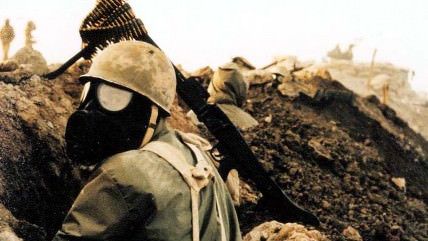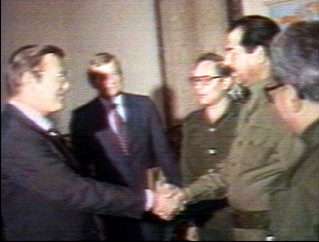Declassified CIA Documents Reveal US Helped Saddam Hussein Knowing He Would Use Chemical Weapons


Recently declassified documents reveal the U.S. was willing to help Saddam Hussein in the war between Iraq and Iran in the 1980s, despite knowing that he had and intended to use chemical weapons.
From Foreign Policy:
In 1988, during the waning days of Iraq's war with Iran, the United States learned through satellite imagery that Iran was about to gain a major strategic advantage by exploiting a hole in Iraqi defenses. U.S. intelligence officials conveyed the location of the Iranian troops to Iraq, fully aware that Hussein's military would attack with chemical weapons, including sarin, a lethal nerve agent.
The intelligence included imagery and maps about Iranian troop movements, as well as the locations of Iranian logistics facilities and details about Iranian air defenses. The Iraqis used mustard gas and sarin prior to four major offensives in early 1988 that relied on U.S. satellite imagery, maps, and other intelligence. These attacks helped to tilt the war in Iraq's favor and bring Iran to the negotiating table, and they ensured that the Reagan administration's long-standing policy of securing an Iraqi victory would succeed. But they were also the last in a series of chemical strikes stretching back several years that the Reagan administration knew about and didn't disclose.
The Obama administration is preparing for a military response to last week's possible use of chemical weapons in Syria. If the use of chemical weapons in Syria is confirmed by United Nations inspectors it will almost certainly prompt military action from some Western countries.
As horrible as the images of the recent suspected chemical attacks in Syria are the number of those killed by the attacks represent a small fraction of the number of people killed so far in the Syrian civil war. Since the beginning of the conflict over 100,000 people have been killed, but it is the suspected use of chemical weapons that is causing the widespread outrage and threats of intervention that have been seen in the last week. As John Glaser pointed out in The Washington Times, the possible use of chemical weapons in Syria does not alter the fact that intervention in Syria would be unwise. Most Americans agree, with a Reuters/Ipsos poll showing that U.S. intervention in Syria is less popular than Congress.
If, as is looking increasingly likely, the U.S. does conduct a military intervention in Syria it is worth remembering that the U.S., while condemning the use of chemical weapons now, once supported a dictator knowing that he intended to use chemical weapons on his enemies, another example of how policy makers too often justify ugly and obscene policies in order to pursue what are considered desirable ends.


Show Comments (109)